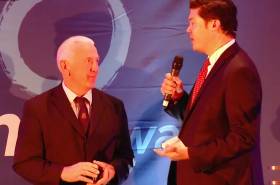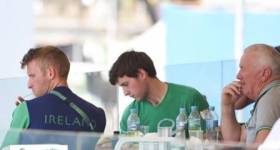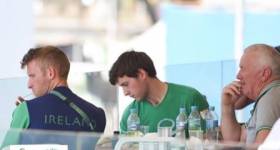Displaying items by tag: Dominic Casey
Puspure Honoured for World-Beating Year
#Rowing: The Afloat Rower of the Year 2018 is Sanita Puspure. The Old Collegians competitor proved herself the best single sculler in the world. She took silver at the World Cup regattas in Belgrade and Lucerne, running the defending champion, Jeannine Gmelin of Switzerland, extremely close (.23 of a second) in the Lucerne final.
Working with coach Dave McKenzie McGowan and high performance director Antonio Maurogiovanni, who set a very heavy training schedule, Puspure decided to miss the European Championships so that she could concentrate on the World Championships in Plovdiv in Bulgaria in September. She won her heat and semi-final, and then overcame bobbly conditions in the final. She established a clearwater lead. Gmelin came back at her in the third quarter; Puspure was not for catching. She won by two lengths of clear water.
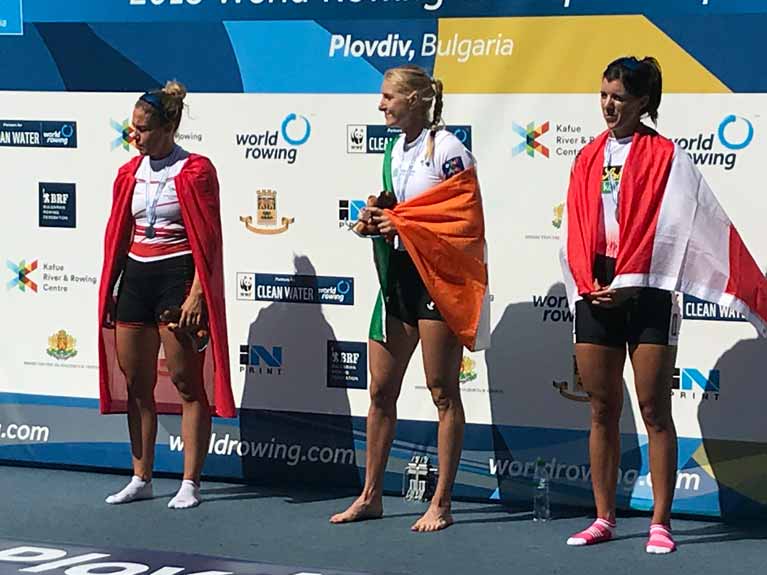 Sanita Puspure (centre) smiles after being presented with her gold medal at the World Championships. Jeannine Gmelin (silver) is on the left and Magdalena Lobnig (bronze) on the right. Photo: Liam Gorman
Sanita Puspure (centre) smiles after being presented with her gold medal at the World Championships. Jeannine Gmelin (silver) is on the left and Magdalena Lobnig (bronze) on the right. Photo: Liam Gorman
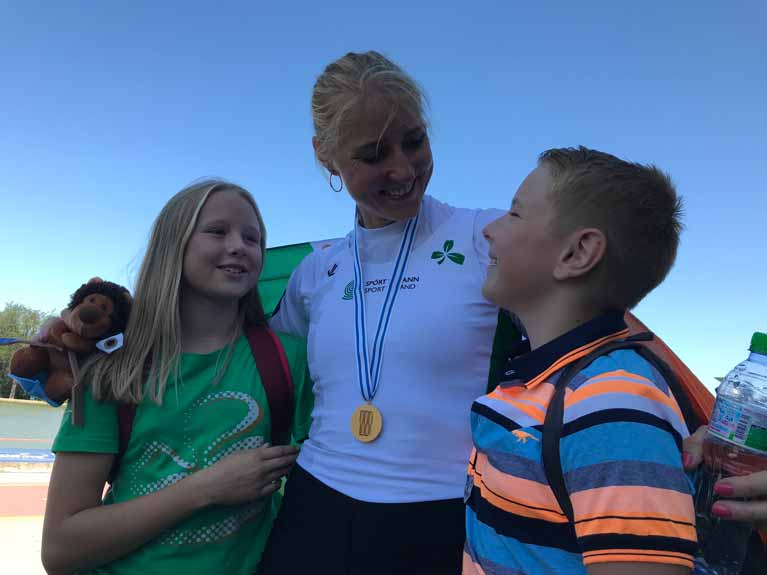 Sanita with Daniella and Patrick, her children, after winning World Championship gold. Photo: Liam Gorman
Sanita with Daniella and Patrick, her children, after winning World Championship gold. Photo: Liam Gorman
The win was a twin highlight at the end of a wonderful year. The O’Donovan brothers, Gary and Paul, won the lightweight double sculls gold in Plovdiv, making history as the first Ireland crew to take World Championship gold in an Olympic boat. They overcame terrible conditions and a poor lane draw to win in the quarter-final. This was succeeded by a semi-final in which they looked tired and could only take third. The final saw them in the unfavoured lane six for the final.
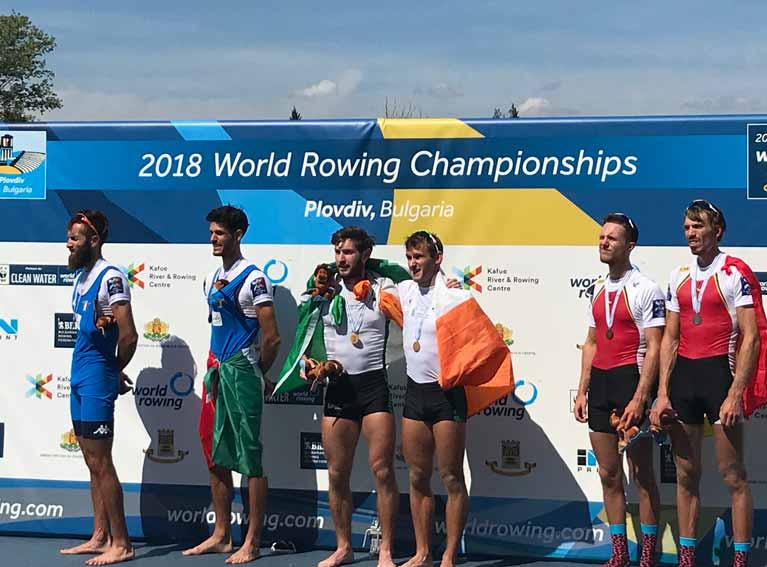 Ireland gold medalists Gary and Paul O'Donovan on the World Championship podium in Plovdiv, Bulgaria, with Italy (silver) and Belgium (bronze)
Ireland gold medalists Gary and Paul O'Donovan on the World Championship podium in Plovdiv, Bulgaria, with Italy (silver) and Belgium (bronze)
In a stirring race, the Skibbereen men saw off Italy. They would describe it as the best race they had ever rowed. They were outstanding in their steadiness, and over the second, third and fourth quarters they were the fastest crew. They took over the lead from Italy between 1200 and 1500 metres and rebuffed the charge by the men in blue to win by three-quarters of a length.
In a first for a women’s sweep crew from this island in an Olympic boat, Aifric Keogh and Emily Hegarty, the Ireland women’s pair, also reached an A Final at the World Championships. The World Under-23 Championships were also laden with success, with four A Finalists, gold for Shane Mulvaney and David O’Malley in the lightweight pair and silver for Miles Taylor, Niall Beggan, Ryan Ballantine and Andrew Goff in the lightweight quadruple.
Come the Fisa World Rowing Awards, Dominic Casey was honoured as the coach of the year.
In a season of success, Sanita Puspure is the Afloat Rower of the Year.
Afloat Rower of the Month awards: The judging panel is made up of Liam Gorman, rowing correspondent of The Irish Times, and David O'Brien, editor of Afloat magazine. Monthly awards for achievements during the year appeared on afloat.ie.
Dominic Casey is the World Rowing Coach of the Year
#Rowing: Dominic Casey has been chosen as the World Rowing Coach of the Year. The Skibbereen man, who coached Paul and Gary O’Donovan to a World Championship gold medal this year, received the award at a gala in Berlin. He had also been nominated in 2016 and 2017. In these years he oversaw the first Olympic medal for Ireland rowing, when the O’Donovan brothers took silver in Rio de Janeiro, and a string of gold medals for Mark O’Donovan and Shane O’Driscoll in the lightweight pair. In 2017, lightweight single sculler Denise Walsh also took silver in the European Championships and a World Cup silver.
Other awards on a glittering night went to the Australian men’s four, who were named the male crew of the year ahead of Paul and Gary O’Donovan, and the Poland quadruple, who took the women’s crew of the year, an award for which Sanita Puspure was nominated.
The 2018 World Rowing Para Crew of the Year is the Dutch PR2 mixed double of Annika van der Meer and Corne de Koning. The Sri Lankan oarsman and university student, Amidu Silva, won the 2018 Filippi Spirit Award.
The World Rowing Sustainability Award was taken by Alan Robinson and Schuylkill Navy for Love Where you Row.
The 2018 Distinguished Service to International Rowing award was won by Borge Kaas Andersen of Denmark.
Casey Nominated for Top Coaching Award
#Rowing: Ireland coach Dominic Casey has been chosen as one of the finalists for the Coach of the Year at the World Rowing Awards for the second successive year. Casey coaches the Ireland lightweights, who had an extraordinary 2017.
The lightweight pair of Mark O’Donovan and Shane O’Driscoll capped a year of wins in the World Cup events and the European Championships with a World Championship gold. Paul O’Donovan also took top position on the podium in Florida after winning the lightweight single sculls. He and his brother Gary had taken two World Cup medals and a European Championship silver in the lightweight double. Denise Walsh was a World Championship finalist and took medals at the European Championships and the World Cup in Belgrade. The Ireland lightweight quadruple and the lightweight pair of David O’Malley and Shane Mulvaney took medals at the World Under-23 Championships.
Casey has also been nominated for an award for Distinguished Services to International Rowing. Former Ireland high performance director, Morten Espersen, is also a nominee for this award.
Dominic Casey and Sean Casey Take Up Coaching Roles With Rowing Ireland
#Rowing: Rowing Ireland has announced two new appointments to the high performance coaching team.
Dominic Casey, who coached Paul and Gary O’Donovan to silver in Rio while working on a temporary basis, becomes a full time coach for the four years to Tokyo 2020. In his new role as High Performance Coach, Dominic Casey will oversee and lead the development of the lightweight group.
Casey said: “I am really looking forward to working with our group of talented lightweights and producing further international success.”
Sean Casey also joins the high performance coaching team and will be tasked with heavyweight rowing development.
Morten Espersen, High Performance Director, said: “Sean’s position is a temporary appointment until our final funding figures from Sport Ireland are confirmed early in 2017 but we believe Sean’s appointment is critical to lead the development of our heavyweights.”
Dominic Casey a Finalist for World Rowing Coach of the Year
#Rowing: Dominic Casey has been named as a finalist for the coach of the year in the World Rowing Awards for 2016. The Corkman guided the Ireland lightweight double of Paul and Gary O’Donovan to a silver medal at the Olympic Games. The crew also won gold at the European Championships and silver at the World Cup in Varese in Italy. Paul O’Donovan, also coached by Casey, won gold in the lightweight single sculls at the World Rowing Championships. The Olympic gold medallists in the lightweight double, Pierre Houin and Jeremie Azou of France, have made the final for Male Crew of the Year. The council of Fisa, the sport’s governing body, picked the finalists after a public nomination process which began on October 9th. The winners will be announced on December 2nd.



























